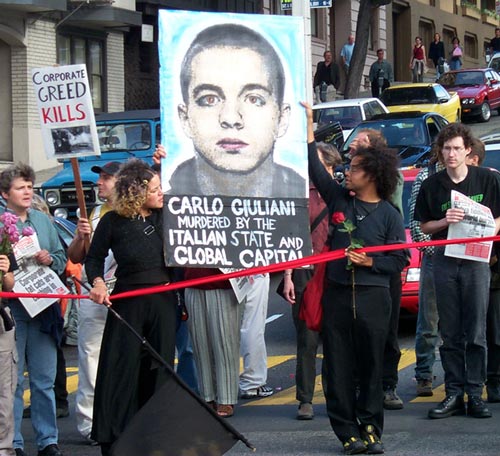From the Open-Publishing Calendar
From the Open-Publishing Newswire
Indybay Feature
Corporate Greed Kills
Corporate Greed Kills

San Francisco -- While two bullets to the forehead killed Carlo Giuliani, the leaders of the wealthiest nations need to seriously address the institutional violence of a global economy that condemns billions of the world’s people to absolute poverty. Each day that these Presidents and Prime Ministers - who have recently begun to present themselves as champions of the world’s poor - pose for group photos, and dine on fine meals, over 19,000 children will die worldwide from the various debt crises, and 8,000 people will die of AIDS. It is unacceptable for global leaders to pave over protesters’ legitimate concerns with rosy economic forecasts when the programs that they tout, such as structural adjustment policies, exacerbate poverty for the world’s poor, rather than alleviate it. (Monday 23 July 2001 - David Hanks/Global Exchange)
The following opinion to the editor was writtien by Ted Lewis of Global Exchange and carried in many newspapers:
The following opinion to the editor was writtien by Ted Lewis of Global Exchange and carried in many newspapers:
For more information:
http://www.globalexchange.org
We are 100% volunteer and depend on your participation to sustain our efforts!
Get Involved
If you'd like to help with maintaining or developing the website, contact us.
Publish
Publish your stories and upcoming events on Indybay.
Topics
More
Search Indybay's Archives
Advanced Search
►
▼
IMC Network



By Ted Lewis
Many Americans may be wondering what led to the massive demonstrations at the economic summit in Genoa, Italy. The answer: The protesters are convinced that the managers of globalization are taking our world in the wrong direction.
As President Jacques Chirac of France noted during the summit, "One hundred thousand people don't get upset unless there is a problem in their hearts and spirits."
Trade unionists, environmentalists, human-rights advocates, AIDS activists and proponents of Third World debt cancellation fear that corporate globalization is leading to wealth inequality, increasing job insecurity, the destruction of our environment and, perhaps most frighteningly, the weakening of our democracies.
In Genoa, eight men gathered to make decisions about how the world would address some of the most critical global problems -- the AIDS pandemic, the staggering debt of Third World countries and the massive poverty in developing nations. These leaders insisted they were democratically elected. True, but they represent a total population of about 800 million out of the world's more than 6 billion people. Africa was allowed only a token representation, even though its problems were high on the agenda.
The summit in Genoa was a meeting of the global rulemakers -- a country club world government.
The rulemakers' globalization, with its twin banners of unfettered free trade and unmanaged free markets, is a new colonialism that has had devastating effects, both in the Third World and in the industrialized countries. Each day that these presidents and prime ministers posed for group photos and dined on fine meals in Genoa, more than 19,000 children died worldwide from the effects of the poor country's debt crises, and 8,000 people died of AIDS. Deaths from preventable disease have risen, not decreased, in the last decade and the gap between the rich and the poor has increased. From South Central Los Angeles to Soweto, South Africa, a huge number of the world's people are not benefiting from a global economy that caters to investors and bankers.
The demonstrations around the world are growing out of a deep, abiding sense that the global rulemakers, for all their talk, just don't get it. It is unacceptable that our leaders give mere lip service to the desperate plight of the estimated 1.3 billion people who survive on less than $1 day. Economic policies like ones the World Bank and the International Monetary Fund have imposed on more than 80 countries during the past two decades have required severe cutbacks in government spending on health service, education, and wage and farm subsidies. As a result, living standards often plummeted.
President Bush has repeatedly said that the demonstrators are condemning the poor to continuing poverty. The facts show the opposite.
Take the example of our neighbor, Mexico. According to the Mexican government, wages in Mexico's manufacturing sector have dropped 10 percent since NAFTA began. And the World Bank reports that inequality in that country has not decreased since Mexico began its market liberalization 15 years ago.
What the summit in Genoa made startlingly clear is that democracy has reached a new low when communication between leaders and their citizens must happen through steel grates, police lines and noxious clouds of tear gas. And the death of a 23-year-old Italian demonstrator, Carlos Giuliani, should give us all pause.
The vast majority of demonstrators want a dialogue. But they want real action, too. Without it, the basic needs of billions of people will go unmet.
Ted Lewis directs the political and civil-rights program at Global Exchange, an international human-rights organization based in San Francisco. He can be reached at pmproj [at] progressive.org.
©Ted Lewis.